In today’s fast-paced world, where medications are a common recourse for various ailments, understanding the nuances of drug allergies has never been more crucial. The drug allergy definition goes beyond a simple adverse reaction, delving into the body’s immune response when it mistakenly identifies a medication as a threat. With a vast medication allergy list and various types of drug allergy, it’s essential to be informed and prepared. Whether you’ve experienced a drug allergy reaction firsthand or are simply looking to educate yourself, this blog will guide you through the maze of drug allergy symptoms, treatments, and alternative medications. And for those seeking immediate relief from common allergy symptoms, we’ve got some invaluable tips to relieve allergy symptoms that can make a world of difference. Let’s embark on this enlightening journey together.
What Drug Allergy Means?
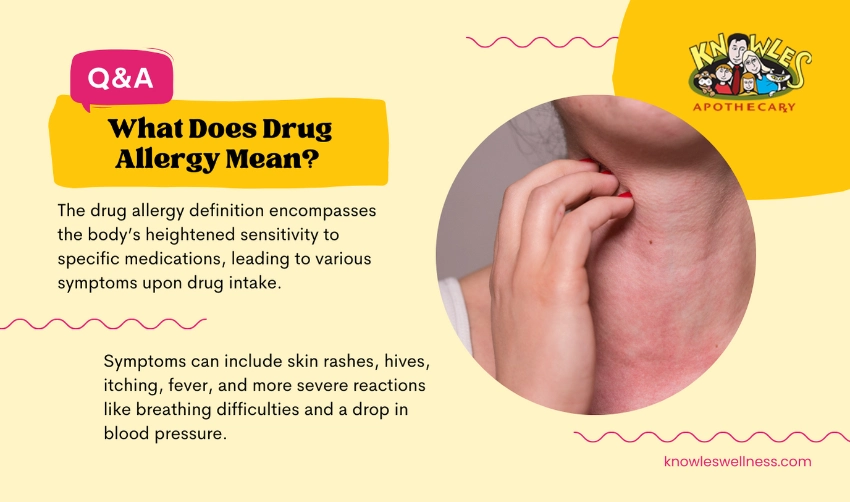
A drug allergy refers to an adverse reaction of the body’s immune system to a medication. The drug allergy definition encompasses the body’s heightened sensitivity to specific medications, leading to various symptoms upon drug intake. Unlike standard side effects, a drug allergy reaction is the immune system’s defensive response, mistakenly identifying the drug as a harmful invader. This misidentification prompts the body to produce antibodies against the drug, causing allergic reactions during subsequent exposures. There are various types of drug allergies, ranging from mild to severe.
Some people might experience hives or a skin rash, while others could face life-threatening reactions like anaphylaxis. The medication allergy list is extensive, with some drugs being more commonly associated with allergies than others. For instance, antibiotics like penicillin and pain relievers such as aspirin and ibuprofen are frequent culprits. Recognizing drug allergy symptoms is crucial for timely intervention. Symptoms can include skin rashes, hives, itching, fever, and more severe reactions like breathing difficulties and a drop in blood pressure.
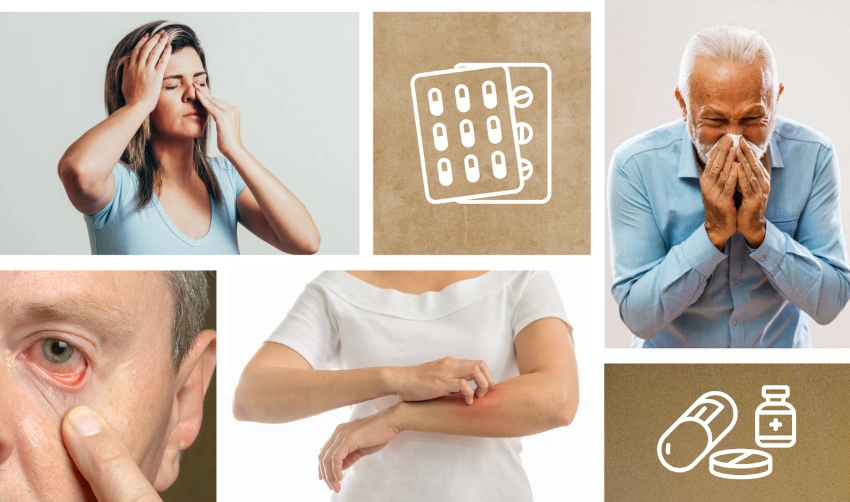
To manage and alleviate these reactions, drug allergy treatment is essential. The primary step in treatment is discontinuing the offending medication. In cases of severe reactions, immediate medical attention is required, and treatments like antihistamines or corticosteroids might be administered. For those with a history of severe drug allergies, carrying an epinephrine auto-injector is advisable. Furthermore, it’s crucial to inform healthcare providers about any known drug allergies to avoid future complications.
In some instances, if no alternatives are available, a process called drug desensitization might be employed. This involves taking the drug in increasing amounts under medical supervision until the body can tolerate the required dose. It’s worth noting that just as there are treatments for drug allergies, there are also remedies for other types of allergies. For instance, summer allergy treatments are available to help individuals combat seasonal allergic reactions. In conclusion, understanding drug allergies, their symptoms, and available treatments is vital for ensuring safety and well-being when taking medications.
How Long Does It Take to Have an Allergic Reaction to a Drug?

A drug allergy is a complex immune response where the body mistakenly identifies a medication as a harmful substance. The drug allergy definition encompasses this adverse reaction, which can manifest in various ways, depending on the individual and the medication involved. Typically, the drug allergy symptoms appear within an hour of taking the medication. However, in some cases, the drug allergy reaction can be delayed, presenting itself several hours, days, or even weeks after the drug’s administration.
Immediate reactions might include red and warm skin, hives, itching, swollen mucous membranes, and fluid retention in the body’s tissues. Severe reactions, such as anaphylactic shock, can lead to more alarming symptoms like breathing difficulties, confusion, drowsiness, or even cardiac arrest. On the other hand, delayed reactions, which usually occur within a few days, might be accompanied by a skin rash and fever. In rare instances, the allergic reaction can be so intense that it causes organ damage or significant skin peeling.
The medication allergy list is extensive, with certain drugs like antibiotics, painkillers, and dyes used in imaging techniques being more commonly associated with allergies. It’s crucial to understand the types of drug allergies to ensure appropriate drug allergy treatment. Immediate allergic reactions can be managed using steroids or antihistamines, while more severe reactions might require adrenaline injections. For those diagnosed with a drug allergy, alternative drug allergy medication might be necessary. It’s also worth noting that while drug allergies are a concern, there are treatments available for other conditions, such as Eczema creams for skin-related allergies. Recognizing the symptoms and understanding the treatment options is vital for anyone suspecting they have a drug allergy.
What Are the 4 Types of Drug Allergies?
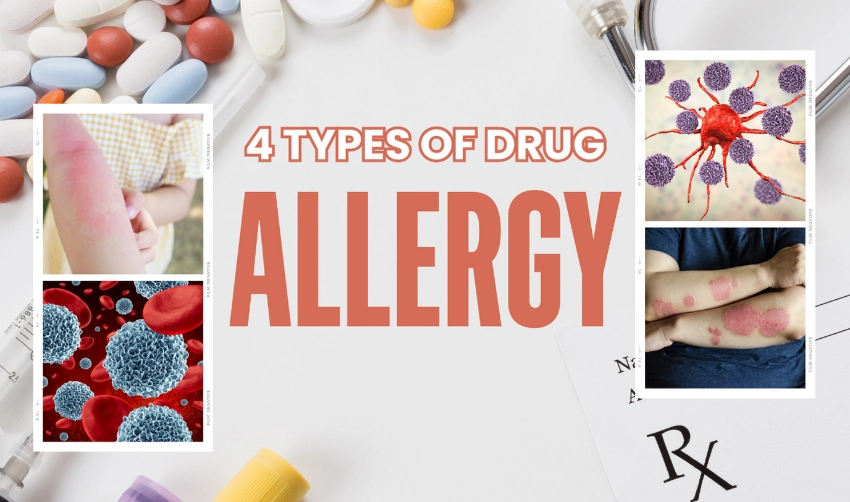
Navigating the world of drug allergies can be daunting, especially when trying to understand the different reactions one might experience. The drug allergy definition encapsulates the body’s adverse immune response to a medication, which can manifest in various ways. This response is distinct from standard side effects, as a drug allergy reaction is the body’s defense mechanism mistakenly identifying the drug as a harmful invader. The medication allergy list is vast, with some drugs being more commonly associated with allergies than others. Understanding the types of drug allergies is crucial for both patients and healthcare providers to ensure timely and appropriate drug allergy treatment. Symptoms can range from mild skin rashes to severe, life-threatening anaphylactic reactions. With the increasing complexity of medications and their interactions, it’s essential to be informed about potential allergic reactions and the available drug allergy medication options. For those seeking personalized medication solutions, our compounding pharmacy services offer tailored treatments to cater to individual needs, ensuring safety and efficacy.
1. Immediate Hypersensitivity

Immediate hypersensitivity is a rapid allergic reaction that occurs within minutes to hours after drug administration. This type of reaction is mediated by specific antibodies called IGE, which bind to the drug and trigger the release of histamines and other chemicals. The symptoms can range from mild skin reactions, such as hives and itching, to severe anaphylactic shock, which can be life-threatening. Immediate hypersensitivity reactions are commonly associated with antibiotics like penicillin and certain pain relievers.
2. Delayed Hypersensitivity
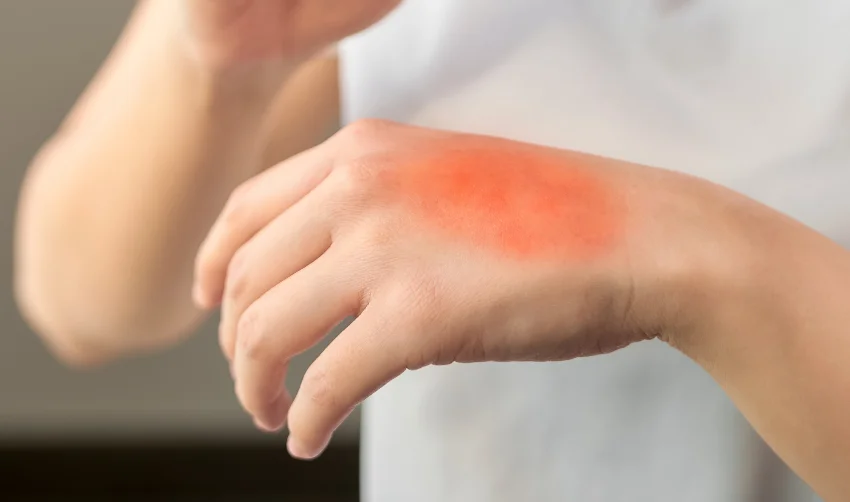
Delayed hypersensitivity reactions, as the name suggests, occur hours to days after exposure to the offending drug. These reactions are T-cell mediated and do not involve antibodies. Symptoms typically include skin rashes, fever, and joint pain. Some anticonvulsant medications and sulfa drugs are known to cause delayed hypersensitivity reactions.
3. Cytotoxic Reactions

Cytotoxic reactions involve the drug-induced destruction of specific cells within the body. This type of reaction is mediated by antibodies, specifically IgG or IgM, which bind to the drug while it’s attached to a cell. This binding can lead to cell lysis or damage. Common manifestations include hemolytic anemia, where red blood cells are destroyed, or thrombocytopenia, where platelets are affected. Some drugs known to cause cytotoxic reactions include quinidine and certain antibiotics.
4. Immune Complex Reactions
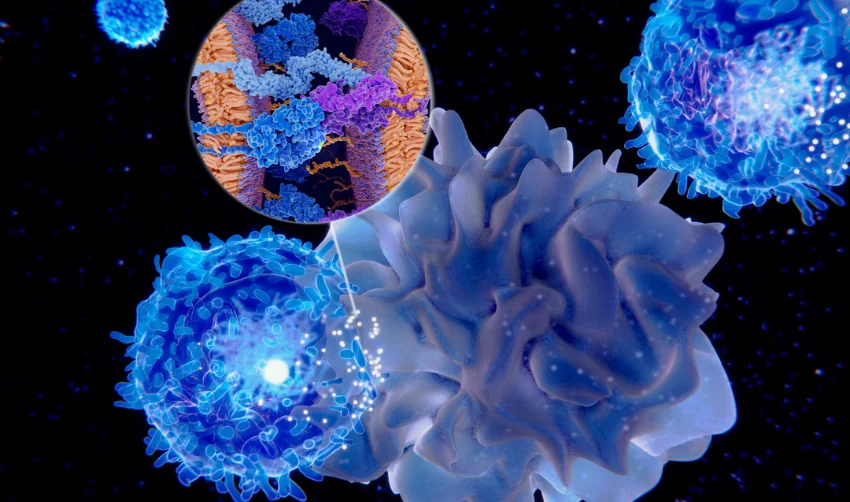
Immune complex reactions occur when drugs form complexes with antibodies, which then deposit in various tissues, leading to inflammation. This type of reaction can affect multiple organs, including the kidneys, skin, and joints. Symptoms might include rash, joint pain, and kidney inflammation. Immune complex reactions are often associated with drugs like allopurinol and hydralazine.
What Are the Most Common Drug Allergy Symptoms?
Navigating the intricate landscape of drug allergies requires a comprehensive understanding of the signs and reactions associated with them. At its core, the drug allergy definition describes an adverse immune response to a medication. This is not to be confused with standard side effects or drug intolerance. Instead, a drug allergy reaction is the body’s defense mechanism mistakenly identifying the drug as a harmful substance and reacting against it. The medication allergy list is extensive, with some drugs more likely to cause allergic reactions than others. While there are various types of drug allergy, they all present a range of symptoms that can help in their identification. Recognizing these drug allergy symptoms is pivotal for timely diagnosis and intervention. Once diagnosed, the next step involves appropriate drug allergy treatment to manage and alleviate these reactions. In some cases, alternative drug allergy medication might be necessary to prevent future allergic reactions. Let’s delve deeper into the most common symptoms associated with drug allergies.
1. Red and Unusually Warm Skin
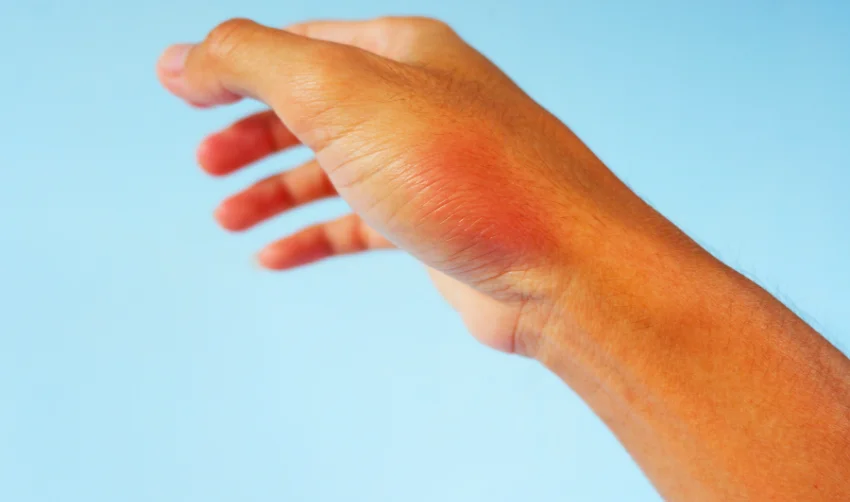
One of the most immediate and visible signs of a drug allergy is the appearance of red and unusually warm skin. This symptom indicates the body’s inflammatory response to the medication. The skin may feel hot to the touch, and the redness can spread across large areas. This reaction is the body’s way of signaling that something is amiss, and the drug might be the culprit.
2. Blotchy Rash

A blotchy rash is another common symptom of drug allergies. Unlike regular rashes, these are characterized by irregular, red patches that can appear anywhere on the body. The rash might be itchy or painful and can vary in intensity, depending on the severity of the allergic reaction.
3. Hives (Nettle Rash)

Hives, also known as urticaria or nettle rash, are raised, itchy welts on the skin. They can vary in size and shape and might merge to form larger areas of swelling. Hives are a clear indication of an allergic reaction and can be triggered by various drugs.
4. Swollen Mucous Membranes
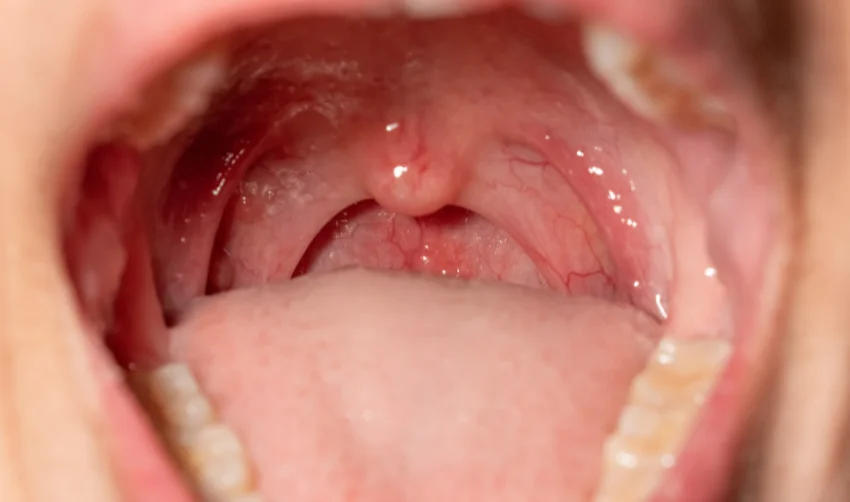
Swelling of the mucous membranes, especially in the mouth, throat, or eyes, is a concerning symptom of drug allergies. This swelling can cause discomfort, difficulty in swallowing, or even breathing problems. Immediate medical attention is required if the swelling leads to breathing difficulties.
5. Fluid Retention in the Body’s Tissues (Edema)

Edema refers to the accumulation of fluid in the body’s tissues, leading to swelling. This can occur in specific areas like the legs, arms, or face, or it can be more generalized. Edema can cause discomfort and tightness in the affected areas and is a sign that the body is reacting adversely to a medication.
How Do You Treat a Drug Allergy Reaction?
Managing a drug allergy effectively begins with a clear understanding of the drug allergy definition. Essentially, a drug allergy is the body’s adverse immune response to a medication. When a drug allergy reaction occurs, it’s crucial to recognize the drug allergy symptoms promptly to ensure timely intervention. The medication allergy list is vast, with some drugs more likely to cause allergic reactions than others. Depending on the severity and the types of drug allergy reactions, different treatments may be required.
The primary step in drug allergy treatment is discontinuing the offending medication immediately. For mild reactions, over-the-counter antihistamines can help alleviate symptoms like itching and hives. In more severe cases, especially if there’s a risk of anaphylaxis, emergency treatment involving epinephrine injections and hospital care might be necessary. Corticosteroids can also be prescribed to reduce inflammation and other allergic symptoms. It’s essential to consult with healthcare professionals to determine the best drug allergy medication and treatment plan. Furthermore, individuals with known drug allergies should always inform their healthcare providers about their condition to prevent future allergic reactions and ensure safe medical care.
Conclusion
Navigating the realm of drug allergies can be overwhelming, but with the right knowledge and resources, you can make informed decisions about your health. From understanding the drug allergy definition to recognizing the myriad of drug allergy symptoms and seeking appropriate drug allergy treatment, every step is pivotal. And while conventional treatments play a significant role, don’t underestimate the power of alternative solutions. For those interested in exploring natural remedies, our herbal remedies pharmacy in Kensington, Maryland offers a plethora of options tailored to your needs. Remember, your health is paramount, and being informed is the first step towards ensuring your well-being.


